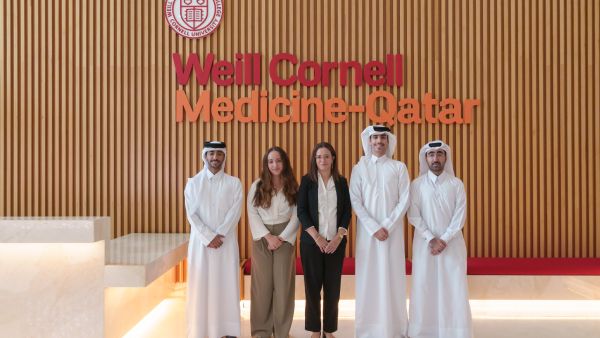WCM-Q student perspective paper uses microbiome-based solutions to address the growing global challenge of antimicrobial resistance

Four students from Weill Cornell Medicine–Qatar (WCM-Q) are named as joint first co-authors on a perspective paper proposing microbiome-based solutions to combat antimicrobial resistance (AMR). They were guided by their supervisor, Dr. Ghizlane Bendriss, assistant professor of biology at WCM-Q, who is the lead author of the paper. The paper has been published in Frontiers in Microbiomes, a leading scientific journal.
Students Ali Al-Kuwari, Hamad Al-Karbi, and Abdulla Al-Khuzaei, all from the Class of 2029, and Dounia Baroudi, from the Class of 2030, conducted the study in response to an announcement at the 7th edition of the World Innovation Summit for Health (WISH), held in November 2024, which emphasized that tackling AMR was a national priority.
AMR is a growing global concern, driven by the overuse of antibiotics, which leads to the emergence of resistant strains. The paper explores the potential of boosting diversity in gut microbiome as a natural strategy to reduce dependency on antibiotics and combat AMR.
The perspective paper discusses several strategies to address the loss of diversity caused by antibiotics, including diet, probiotics, fecal transplants (FMT), and the fermentation of animal and plant products. Preliminary findings from an experiment with camel milk fermentation suggest that fermentation increases microbial diversity, enhances microbiome resilience, and potentially reduces resistance to common antibiotics like tetracycline, streptomycin, penicillin, and chloramphenicol. The increase of diversity allows the microbiome to naturally resist pathogens without additional antibiotic use.
Dr. Bendriss, whose multidisciplinary research centers on the gut-brain axis and how lifestyle factors influence brain development and physiology through the modulation of the gut microbiome, said: “Over the past four decades, antibiotic innovation and approvals have sharply declined, with annual FDA approvals dropping from about three in the 1980s to barely one today, the share of new antibiotics falling from 20 percent to 6 percent of drug approvals, and almost no truly new classes emerging since the mid-20th century. To effectively address AMR, we really need to completely shift our strategy. Microbes already possess a natural ability to fight one another by competing for nutrients and by producing antimicrobial metabolites. An enriched gut environment helps prevent the dominance of resistant strains. Misuse of antibiotics themselves can create a vicious cycle, where a disrupted microbiome can create fertile ground for these strains to thrive, undermining the effectiveness of future antibiotic treatments. Therefore, I believe that microbiome-based solutions such as probiotics or FMT can offer the most sustainable alternative to traditional pharmaceutical interventions. FMT occurs naturally in the animal world and is also considered a promising method to restore microbiome balance and mitigate the impact of AMR. Let it be a fight between microbes.”
Additionally, the paper discusses a mechanistic model to underscore the importance of maintaining microbial balance as an effective strategy for mitigating AMR and promoting long-term health. Further research is, however, still needed to better understand the mechanisms behind these changes and their implications for public health.
Student Al-Kuwari said: “Working alongside my peers under the guidance of Dr. Ghizlane Bendriss has been an incredible opportunity to grow, learn, and collaborate in a supportive environment. This project deepened my understanding of the microbial world and introduced me to the boundless potential of microbiome-based approaches in tackling real-world health challenges. With antimicrobial resistance becoming an increasingly urgent global concern, contributing to research that explores innovative, targeted solutions has been both timely and meaningful. As someone passionate about research, it’s been a true pleasure to engage with such a fascinating topic alongside a team I genuinely enjoy learning with.”
Fellow student Baroudi said: “Contributing to this paper was an incredibly enriching experience; it really opened my eyes to how closely human health is tied to the microbial world. I was particularly intrigued by the potential of fermented camel milk, something I hadn’t thought about before as a natural way to support our microbiomes. Through this research, I realized that fighting harmful bacteria isn’t just about using more antibiotics; sometimes, it’s about finding better ways to restore and encourage a healthy balance of microbes. This research focuses on identifying sustainable approaches, like fermentation and restoring microbial balance, as innovative ways to nurture microbial ecosystems and offer new hope against the growing problem of antibiotic resistance.”
The paper was made possible through funding from the pre-medical department at WCM-Q. To read the paper, titled ‘Beyond antibiotics: leveraging microbiome diversity to combat antimicrobial resistance,’ click here: https://www.frontiersin.org/journals/microbiomes/articles/10.3389/frmbi…
Background Information
Weill Cornell Medical College in Qatar
Weill Cornell Medicine - Qatar is a partnership between Cornell University and Qatar Foundation. It offers a comprehensive six-year medical program leading to the Cornell University M.D. degree with teaching by Cornell and Weill Cornell faculty and by physicians at Hamad Medical Corporation (HMC), Aspetar Orthopedic and Sports Medicine Hospital, the Primary Health Care Corporation, the Feto Maternal Center, and Sidra Medicine, who hold Weill Cornell appointments. Through its biomedical research program, WCM-Q is building a sustainable research community in Qatar while advancing basic science and clinical research. Through its medical college, WCM-Q seeks to provide the finest education possible for medical students, to improve health care both now and for future generations, and to provide high quality health care to the Qatari population.






